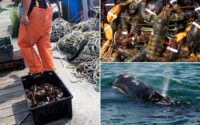Woman loses half her ear in angry otter attack while tubing down Montana river
A Montana woman was left with a face full of stitches and a chunk of an ear chewed off after being attacked by an angry otter while tubing down a Montana river.
Jen Royce and two friends were enjoying an evening of floating peacefully down a wide stretch of the Jefferson River near Bozeman on Wednesday when the otter descended upon them just after 8 p.m., the woman recalled on social media.
“I saw one otter right behind my friend before it attacked,” Royce wrote in a Facebook post detailing the ambush. “I didn’t even have a chance to get the words ‘there is an otter behind you’ out of me before it attacked her.”
She said the animal was “vicious and relentless” as it lunged at her.
“It bit my face in several places, both of my ears, by arms, my hands, my legs, my thighs, and my ankle,” she wrote.
WARNING: Graphic Images
“My friends were bit on the hands and on their bottoms. One friend’s thumb was SHREDDED and she has bite marks all over her body as well.”
Royce explained that they were in a deep stretch of the river during the attack, which prevented the ladies from finding any footing as they tried to defend themselves and gave the otter a serious home-field advantage.


“The water was definitely where they excelled in their attack and we were helpless. I tried to kick it away but I would just get attacked somewhere else,” she wrote.
“I tried to hold it back at one point by grabbing its arm to hold it away while trying to swim closer to shore. Once I had my feet under me I was able to fight back better and was eventually able to pull myself out of the river. It swam away after that.”
“God’s honest truth, I did not think I was going to make it out of that river. I had no clue if my friends were going to make it out. But by the grace of God we did.”
When the dust settled the three friends found they had been separated during the fray of battle, with Royce bleeding on one bank of the river, another on the opposite, and the third stranded on a rock still in the middle of the water.
Unsure whether the beast would return to finish what it started, the three decided to stay put and call to each other across the water — while casting stones into the river to keep their friend safe from further assault.


One of the friends had managed to hold onto their phone and used its SOS feature to call for help. But the group was in such a remote location that dispatchers struggled to pinpoint where to send rescue crews.
“I was covered in blood and it just kept pouring out from my face and nose. It was cold. We were wet. It was dark. We had no real ‘good’ visual on each other due to distance. All we could do was scream and call out to one another. To anyone. But we were just so d–n far away. From anything.”
Finally, just under an hour after calling for help, Royce and her friends saw siren lights approaching in the distance. As crews still didn’t know exactly where they were, the friend on the opposite bank decided to run and flag them down as Royce was beginning to get severely light-headed.

“I was extremely faint and I honestly didn’t know what was happening to my body. With all my heart I did not think I was not going to wake up if I closed my eyes and passed out.”
Paramedics finally arrived, and Royce was airlifted to an emergency room where she underwent surgery.
“I have more stitches in my body than I can count,” she said, rattling off a laundry list of the injuries she received at the otter’s paw.
“Besides my face, I have puncture wounds to my left ankle, both legs, back of my right thigh, both arms, both hands, and all fingers. My left ear is split in half from the top to the bottom and is being held together with some kind of yellow bandage and stitches on both sides.”
“I have lost almost half of my right ear. But I am lucky, and I am grateful, and I am alive.”
Though commonly seen as furry, fun-loving, hand-holding, slippery balls of adorable, Montana Fish, Wildlife and Parks advise that in fact, otters can become aggressive if people come too close to their young or food resources.


